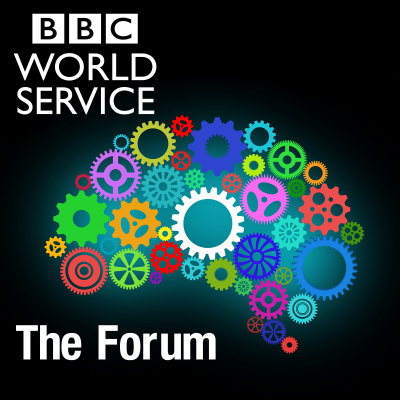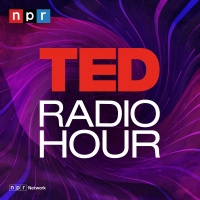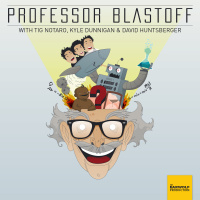Sinopse
A world of ideas
Episódios
-
Imhotep: The man behind The Mummy
22/08/2019 Duração: 37minFans of Hollywood cinema may recognise the name Imhotep from the original The Mummy film from 1932, and its various remakes. In the movie, Imhotep (played by Boris Karloff) is an Ancient Egyptian high priest who was mummified alive because he had attempted to resurrect his forbidden lover. Fast forward several thousand years, and an archaeologist brings the mummy back to life, with dangerous consequences.The real Imhotep was a far cry from this Hollywood invention. A high priest yes, but also possibly the architect of the first monumental building fashioned entirely of stone, the Step Pyramid which dates from around 2,600 BC. Imhotep was also an adviser to one of the most important pharaohs, King Djoser, as text on a statue base found at the Step Pyramid confirms. Later generations revered Imhotep as a sage and a scribe, one of the highest honours a person could be paid in Ancient Egypt. He eventually became linked with the Greek god of medicine, Asclepius, and then worshipped as a saint. Bridget Kendall
-
Andy Warhol: The prince of Pop Art
15/08/2019 Duração: 39min"In the future everybody will be world-famous for fifteen minutes” is probably the best known quote attributed to Andy Warhol. Warhol was an American artist who became a superstar in the visual art movement known as Pop Art. He crossed the boundaries between art and celebrity becoming famous for what we now call branding, but the private Warhol was a deeply religious man and to his close relatives was known simply as ‘Uncle Andy’. In a world where some of what he predicted has come true, we look back at the life and work of this iconic figure.With Bridget Kendall to explore Andy Warhol are Eric Shiner the former Director of the Andy Warhol Museum in Pittsburgh USA and New York Director of London’s White Cube, Professor Jean Wainwright the British art historian and curator and a leading expert on Warhol and Andy Warhol’s nephew, the artist and illustrator James Warhola.(Photo: Andy Warhol. Credit: Ullstein Bild/Getty Images)
-
Coco Chanel: French style icon
08/08/2019 Duração: 39min“I didn’t like my life, so I created my life,” the French fashion designer, Coco Chanel declared. And what a life it was: from her humble beginnings in an orphanage, Chanel blazed a trail as a fiercely independent woman, rising to become the toast of French high society. She mixed with the artists who defined modernism in the 1920s and ‘30s, and created a fashion empire which today is a multi-billion dollar business that still dominates the luxury clothes and accessories market.The suit, the little black dress and the handbag are just some of the items Chanel shaped in a career which covered much of the 20th century. Luxurious and elegant, but also practical, her designs gave women freedom to move and pursue the kinds of activities which were now opening up as society’s barriers were being broken down.But the woman herself was a web of contradictions. While she contributed to the emancipation of rich women, she limited her workers’ rights. And controversially, she was involved with a Nazi officer in occu
-
Nineteen Eighty-Four: Orwell's dystopian classic
01/08/2019 Duração: 39minThe vision of the future evoked in George Orwell’s last novel Nineteen Eighty-Four was so terrifying to its first readers that some claimed to be unable to sleep at night. When the book was adapted by the BBC for the new medium of television after Orwell’s death, millions became aware of the novel’s concepts and language which have since seeped into Western popular culture. Big Brother, Room 101, the thought police, doublethink: few novels of the 20th century have had such a lasting impact.Over the seventy years since its publication, world events have brought Orwell’s vision into focus at various points. The Cold War, the collapse of Communism, the rise of surveillance, and the inauguration of President Trump are among those moments in history which have made readers return to the novel time and again.Joining Bridget Kendall to discuss the origins of Orwell’s novel and its ongoing relevance are Professor John Rodden, author of George Orwell: Life and Letters, Legend and Legacy; journalist and writer Doria
-
The Spartans: Ancient Greece’s fighting machine
25/07/2019 Duração: 39minFor over two and a half thousand years the Ancient Greek Spartans have been known for their military might, discipline and self-sacrifice. Recent popular culture has portrayed them as the ultimate fearless warriors, especially ‘the 300’ Spartans who fought to the death at Thermopylae. But where does this image come from, and what do we really know about Spartan society and the peculiar utopia it tried to create? The city-state of Sparta has been admired for its stability, frugality, and the unusual social and sexual freedom of its women. But Sparta was also famous for its brutality towards its huge slave population, its authoritarian rule, and its policy of racial purity and eugenics that would eventually prove its undoing.Bridget Kendall talks to Christy Constantakopoulou, Professor of Classics and Ancient History at Birkbeck, University of London; Paul Rahe, Professor of History at Hillsdale College in the US; and Angie Hobbs, Professor of the Public Understanding of Philosophy at the University of Sheffiel
-
Leeuwenhoek: The fabric seller who discovered bacteria
18/07/2019 Duração: 39minAntonie van Leeuwenhoek opened up a whole new world to us; he was the first to observe bacteria and other microscopic lifeforms which could not be seen by the naked eye. He is now regarded as the father of microbiology and yet he had neither scientific training nor university education, and spent his life first as a linen merchant and then a civil servant in a small Dutch city. To understand quite how game-changing Leeuwenhoek’s discoveries were, you have to imagine a world where just about everyone on the planet could only see things that were within the range of unaided human eyesight. Magnifying glasses were the preserve of a privileged few, and other optical instruments, such as simple telescopes and microscopes, were rarer still. So it’s little wonder that Leeuwenhoek was met with disbelief when he claimed that he had seen bustling, vibrant lifeforms in what for everyone was just a drop of clear, pure water.To find out how this extraordinarily curious Dutchman arrived at his discoveries, Rajan Datar is j
-
Kafka's The Metamorphosis: A man turns into a monstrous bug
11/07/2019 Duração: 40minA man wakes up in the body of a verminous insect – this is the plot of one of the most celebrated short stories of all time – Franz Kafka’s 1915 novella The Metamorphosis. Dealing with the isolation and absurdity of modern existence, it has fascinated readers all over the world in its openness to varying interpretations, and the way it questions the very norms of society as well as literary form.Joining Rajan Datar to explore this most enigmatic work is Dr Carolin Duttlinger, the author of four books on Kafka and co-director of the Oxford Kafka research centre, Professor Alice Staskova, native of Kafka’s home city of Prague and specialist on Kafka and music, Dr Peter Zusi from the department of Czech Literature at University College London, and with the contribution of the Nigerian novelist Adrian Igoni Barrett who wrote his own take on The Metamorphosis – about a black man in Lagos who wakes up white.(Photo: Kafka's The Metamorphosis choreographed and directed by Arthur Pita at the Linbury Studio Theatre, Ro
-
Hugh Masekela: The iconic South African musician
04/07/2019 Duração: 39minThe story of Hugh Masekela’s life is intertwined with the history of South Africa itself. Born into a relatively privileged family in a mining town east of Johannesburg, Masekela was aware from an early age of the separatist and exploitative legacy of colonialism. As he grew up and discovered his love of music, it soon became clear to him that fulfilling his ambitions as a black musician would have to be done far away from the brutal apartheid government which had come to power in 1948. In his adopted home in the United States, Masekela enjoyed a string of hit records and mixed with the great and the good of the jazz world. By now exiled from South Africa, he used his profile and his music to protest against repression and inequality, and wrote one of the defining songs of the campaign to free Nelson Mandela from prison.In his musical ventures he brought musicians together from across the African continent, in a spirit of Pan-Africanism which was so important to him. When he eventually returned to South Af
-
James Watt: The power of steam
27/06/2019 Duração: 43minIn this 200th year since his death, we look at the life and work of James Watt, the Scottish innovator whose ground-breaking ideas helped power the Industrial Revolution and lay the basis for much of the mechanised world we take for granted now. He wasn't the inventor of the first steam engine - that had existed before his time - but his improved steam engine was vastly more efficient than earlier versions. As a result, industrial production rates soared and workplaces were transformed by new machines: changes that were to revolutionise society as well as industry. So who was James Watt? What inspired him and who helped him? Bridget Kendall talks to historians Dr. Malcolm Dick, Director of the Centre for West Midlands History at the University of Birmingham, and Professor Larry Stewart from the University of King's College in Halifax, Nova Scotia, who specialises in early modern science. She is also joined by curators Val Boa from The McLean Museum in Greenock, Scotland that houses an important James Watt col
-
The Bhagavad Gita: A guide to spiritual wisdom
20/06/2019 Duração: 39minThe Bhagavad Gita didn't start life as an exclusively religious text but over the two thousand years since it was composed the verses have taken on many different layers of meaning. For millions of Hindus today, the Gita has a similar scriptural status to the Quran for Muslims or the Bible for Christians. In the 20th century, others have seen the Gita as a guide to management strategy, a tool for self-help and even a call to arms for Indian independence in the face of British colonial rule.The story begins on a battlefield with the warrior Prince Arjuna suffering a breakdown. As warring families line up on opposing sides, Arjuna appeals to his charioteer Krishna for help in overcoming this existential crisis. In the 700 verses which follow, Krishna presents his friend with three options: the paths of action, knowledge and devotion.Joining Bridget is Professor Chakravarthi Ram-Prasad from the University of Lancaster in the UK, Professor Angelika Malinar from the University of Zürich, Switzerland, and from
-
Cnut: England's Viking king
13/06/2019 Duração: 39minKing Cnut the Great started life as a young Viking warrior, but quickly became one of the most successful kings in Anglo-Saxon history, reigning over a huge empire covering England, Denmark and Norway in the early 11th Century. For some, he was the perfect Christian king; for others, he was a ruthless warlord. Today in popular culture his name is associated with the tale of King Cnut and the waves - the legend of an arrogant king who believed he could stop the tide.Joining Bridget Kendall to disentangle the facts from legends about King Cnut are Else Roesdahl, professor emerita of Medieval Archaeology at the University of Århus, Denmark; Eleanor Parker, lecturer in Medieval English Literature at Brasenose College, Oxford University, UK; and historian Timothy Bolton, author of the biography Cnut the Great.(Image: An illustration where Cnut criticises his courtiers for believing that he could command the tide of the river. Credit: Bettmann/Getty Images)
-
How Afghanistan won its freedom from Britain
06/06/2019 Duração: 39minThe months between May and August 1919 were a crucial time for Afghanistan: it was the period of the Third Anglo-Afghan War followed by the declaration of Afghan independence from Britain. So how was modern Afghan national identity forged? Who were the leaders responsible? Why, in the 19th century, had the country become financially and politically dependent on Britain? And what, a century on, is the legacy Afghanistan's independence struggle?These are some of the issues that Bridget Kendall discusses with historians of Afghanistan, professors Shah Mahmoud Hanifi, Sana Haroon and Benjamin Hopkins. Photo: People hold Afghan flags as they celebrate Afghan Independence Day (Sayed Khodaberdi Sadat/Anadolu Agency/Getty Images)
-
Rasputin: The Siberian mystic who charmed the Tsar
30/05/2019 Duração: 39minRasputin’s story is a familiar one – an illiterate Siberian peasant who managed to secure the confidence of the last Tsar and Tsarina of Russia, while indulging his legendary sexual appetite and love of hard drinking. Rasputin was so revered by his acolytes that they would collect his fingernail clippings, as if they were some kind of holy relic. When his extraordinary life was brought to an equally extraordinary end when he refused to die – murdered eventually in cold blood by a group of aristocrats – it unleashed the Russian revolution, and changed the geopolitical landscape in ways that still resonate today.That’s one version of events that’s held sway for more than one hundred years. And yet so much of the Rasputin legend has been pieced together by those looking to discredit him. Is it possible to peel away the layers of myth-making and get to the heart of who Rasputin really was and what he stood for?Joining Bridget Kendall on a truth-seeking mission is Russian imperial historian Helen Rappaport, au
-
The Moon from Earth
23/05/2019 Duração: 39minFor as long as humans have gazed up at the moon it has been an object of fascination. From the Aztecs to the Romans to the Romantics, the moon has inspired everything from artistic outpourings to religious devotion. So how has our understanding of our nearest cosmic companion changed over the millennia? And, 50 years on from the Apollo 11 Moon landing, how has our relationship with the moon been changed by our lunar explorations?Rajan Datar talks to Monica Grady, Professor of Planetary and Space Sciences at the Open University in the UK; Anthony Aveni, Professor Emeritus of Astronomy, Anthropology, and Native American Studies at Colgate University in the US; and Alexandra Loske, a German art historian and co-author of Moon: Art, Science, Culture.Photo: A couple have dinner on a hill as the Supermoon is seen in Turkey's Kayseri, 2019. (Sercan Kucuksahin/Anadolu Agency/Getty Images)
-
Pearls: Treasures of the sea
16/05/2019 Duração: 40minPearls are the most chameleon-like of jewels: they can sell for millions or for just a few dollars, they have been used to symbolize both chastity and debauchery, they have been conspicuously worn by men and women. The production methods of both cultured and natural pearls have been fraught with controversy and their position as fashion and status symbols has waxed and waned over the centuries. Bridget Kendall discovers the social history of pearls with jewellery historian Beatriz Chadour-Sampson and Pittsburgh University professor Molly Warsh. Plus jewellery writer Victoria Finlay puts to the test one of the more colourful claims about what is in essence an iridescent blob of nacre: that if you drop a pearl in a glass of vinegar it will quickly dissolve.(Photo: Pearls in a shell. Credit: Greg Vaughn/VW Pics/UIG/Getty Images)
-
Thoreau: the writer who went to the woods
09/05/2019 Duração: 39minRajan Datar and guests explore the life and legacy of the American thinker Henry David Thoreau and his famous work 'Walden', which describes the young writer's experiment in living simply at Walden Pond in Massachusetts, for two years, two months and two days in the 1840s. A landmark text in American literature, ‘Walden’ has been enjoyed by generations for its insights into work and leisure, nature, solitude, society, the good life and more. Rajan and guests discuss this book and another of Thoreau’s famous works – the essay known as ‘Civil Disobedience’, read by some of the most influential figures of the twentieth century, such as Gandhi and Martin Luther King. They also reflect on the legacy of Thoreau’s work around the world today, in an age in which his themes – from protesting injustice to living the simple life – continue to resonate with readers. With expert guests Laura Dassow Walls, Kristen Case, John Kaag and Yoshiaki Furui. Produced by Alice Bloch.Photo: Henry David Thoreau (Universal History Arch
-
Fado: Portuguese soul music
02/05/2019 Duração: 39minIn its 200-year lifetime the Portuguese song known as fado has been intertwined with the country's politics. At first it was an expression of the woes of Lisbon's underclass, which perhaps explains its predominantly melancholy character. In the early 20th century when a military coup brought the fascist regime of António Salazar to power, fado was accused of being degenerate music and government officials censored its lyrics. However, as the dictatorship's grip on the country tightened over a 50-year period, fado flourished, and the regime saw its potential as a tourism marketing tool. When democracy was restored in the 1970s, fado began a decline because of its perceived links to the former far-right regime. As those associations have faded with time, fado is now enjoying a renaissance. The music's found favour with a new generation of singers who are taking this nostalgic, yearning song to a global audience.Rajan Datar investigates the ups and downs of fado, its history, legends and mystique, with gue
-
Queen Njinga of Angola: Fearless fighter
25/04/2019 Duração: 39minThe 17th Century Queen Njinga was among the most successful of Africa's rulers in resisting European colonialism: she defied no fewer than 13 different Portuguese governors of modern-day Angola and ruled the kingdoms of Ndongo and Matamba for over three decades. She was no ordinary person, the warrior Queen. She was a fearless fighter, a military strategist, often ruthless, a shrewd diplomat and an inspirational leader in a period of huge turmoil, shifting alliances and conflict. Her name still resonates throughout the region and she stands as a symbol of the continent's fight against oppression. Rajan Datar is joined by professor Linda Heywood, author of the first comprehensive biography of Njinga in English, professor Roquinaldo Ferreira whose many publications include studies of the frequent social and cultural exchanges between Brazil and central Africa; and one of the leading experts on west African economic history Dr Toby Green.(Photo: Statue of Queen Njinga in Luanda, Angola. Sculptor: Rui de Matos.
-
Inside the mind of Leonardo da Vinci
18/04/2019 Duração: 39minLeonardo da Vinci is best known for his paintings - creating masterpieces like the Mona Lisa and The Last Supper. But through his notes and drawings we know him also to have been a sculptor, mathematician, botanist, palaeontologist, anatomist, architect and engineer, recording insights and inventions that were astonishingly ahead of their time. So what do his observations and experiments tell us about his unique understanding of the visible world around him? To mark the 500th anniversary of Leonardo's death Bridget Kendall talks to Martin Kemp, Emeritus Professor in the History of Art at Oxford University in the UK; Carmen C. Bambach, a curator at The Metropolitan Museum of Art, New York, in the US; and Prof Marina Wallace, a curator and art historian.Photo: Leonardo Da Vinci (1452-1519), Self-portrait, Red Chalk Drawing (Christophel Fine Art/Getty Images)
-
Chess: a chequered history
11/04/2019 Duração: 40minIt’s been called the 'gymnasium of the mind', both mental exercise and a way to build self-esteem. Born some 1,500 years ago, the game of chess was one of the world’s first strategy board games, though little is still known about its origins. Was it first conceived to teach Indian army generals? Or devised to turn a tyrannical King into a virtuous ruler? Or was it a meditative diversion for Japanese monks? It’s easy to forget that the modern game of chess is only 500 years old – and that other ancient forms of Chess, like Xiangqi in China and Shogi in Japan, are much older, still evolving and still played today. Joining Bridget Kendall to explore the history of chess, are the chess historians Jean-Louis Cazaux and Rick Knowlton, the novelist Andrei Kurkov who’s followed the dramas of Russian chess through the ages, and the Grandmaster Jovanka Houska who’ll be challenging Bridget to a game of chess in the studio.Photo: Rick Knowlton's sculpted reproductions of the first confirmed chessmen ever discovered. The









